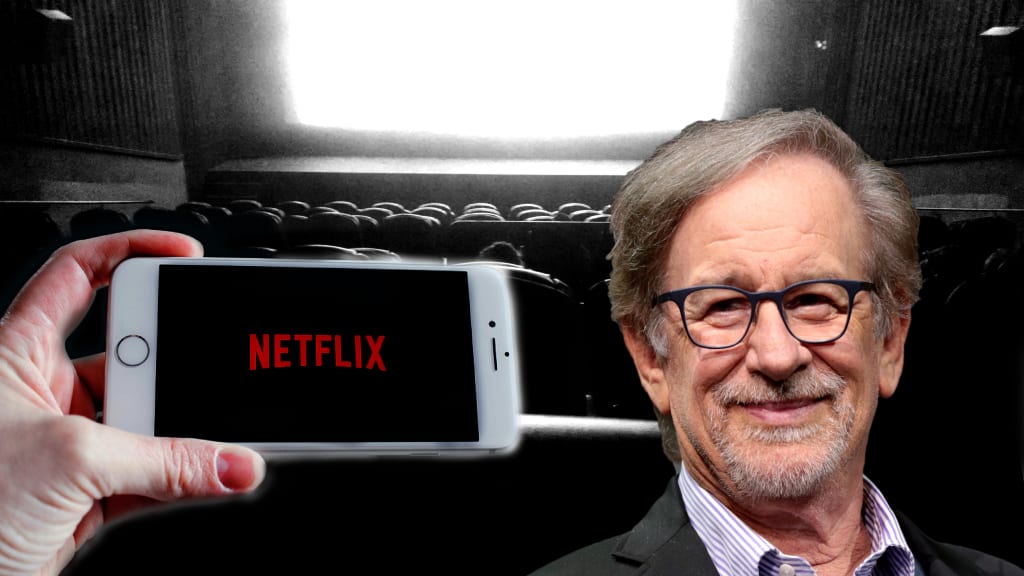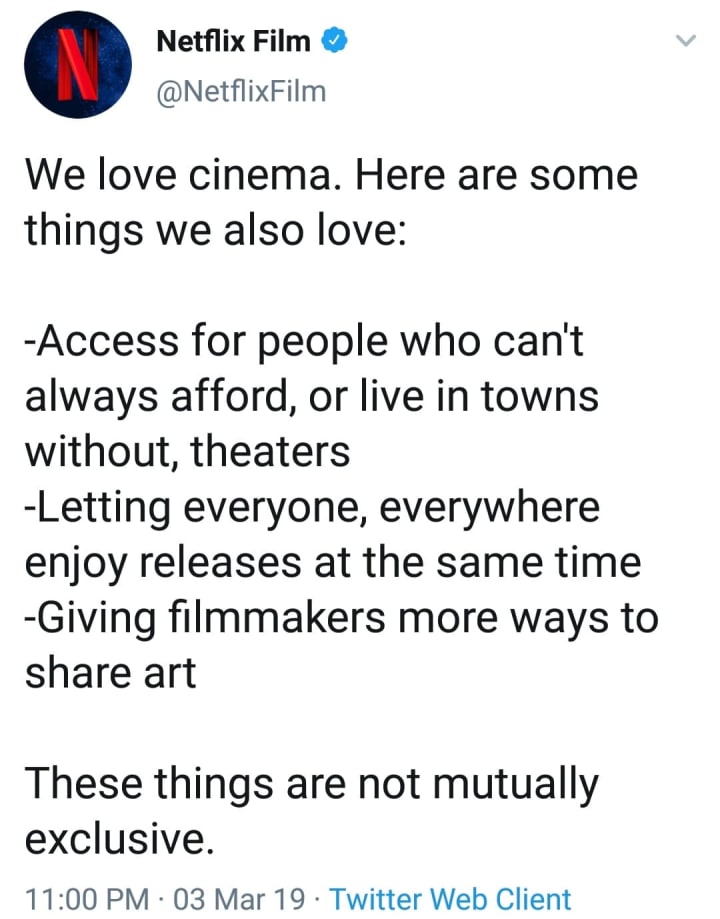Is Cinema Dying at the Hands of Netflix?
Steven Spielberg's plans to propose rule changes regarding Oscar eligibility for films distributed by streaming services have initiated a war between film fans.

The other day I decided to open Twitter because for some reason I convinced myself that would be a valuable way to use my time. I was greeted by a large picture of Spielberg and the headline "Film fans debate Steven Spielberg's proposed changes for Oscars qualification." As a film fan and lover of many of Spielberg's films, I decided to see what this was all about.
The only source behind any of the headlines is an unnamed Amblin spokesperson quoted in IndieWire:
"Steven feels strongly about the difference between the streaming and theatrical situation... he’ll be happy if the others will join [his campaign] when that comes up [at the Academy Board of Governors meeting]. He will see what happens."
That quote is all we know.
As the headlines began surfacing, the debate began. Many on the internet have acted quickly to antagonize Spielberg and label him as a grumpy old white man standing in the way of change and progress. I hear you: This is a guy who has been able to make many great movies because he has a lot of money and resources. It's important to acknowledge one thing, however: Spielberg is one of the best storytellers of all time. This is the guy who directed Jaws, E.T., Schindler's List, Jurassic Park, Close Encounters of the Third Kind, Raiders of the Lost Ark, Hook, The Colour Purple, Saving Private Ryan, Minority Report...
This article is not a defence of Spielberg. Steven Spielberg is one of the most revered people in Hollywood, and he doesn't need a dork like me to come to his defence. The man practically invented the summer blockbuster and has forever changed the world of cinema—but now he's the one publicly standing in the way of change. The question is: Is he right to do so? Yes and no.
On the first page of the Academy's official document outlining Oscar eligibility requirements, it says:
"Academy Awards of Merit shall be given annually to honor outstanding artistic and scientific achievements in theatrically released feature-length motion pictures, and to honor other achievements as provided for in these rules and approved by the Board of Governors."
So what are these proposed changes Spielberg is campaigning for? What is Spielberg trying to change? We don't really know yet.
Spielberg has talked about this several times over the past year. A few days before the Oscars, a couple weeks before this blew up, Spielberg addressed the matter while accepting a filmmaker award from the Cinema Audio Society:
"I hope all of us really continue to believe that the greatest contributions we can make as filmmakers is to give audiences the motion picture theatrical experience, I’m a firm believer that movie theaters need to be around forever. I love television, I love the opportunity. Some of the greatest writing being done today is for television, some of the best directing for television, some of the best performances [are] on television today. The sound is better in homes more than it ever has been in history. But there’s nothing like going to a big dark theatre with people you’ve never met before and having the experience wash over you. That’s something we all truly believe in." —Spielberg
He isn't wrong.
When Roma took home three Oscars last weekend, it became a big part of this conversation. Currently, in order for a film to be eligible for Oscar consideration, it needs to have a theatrical run of at least one week and must be presented to audiences in a theatrical setting before being presented in any other form such as streaming, DVD, or Blu-Ray. This means that "Netflix films" (films distributed by Netflix) can be eligible for Oscars as long as they let it run in theatres for at least one week before putting it on their site. For example, Roma took home three Oscars this year: Best Director (Alfonso Cuarón), Best Cinematography, and Best Foreign Language Film. It also managed to earn itself a Best Picture nomination, becoming one of very few foreign language films to compete in the Best Picture category. It had a limited theatrical run in select cities before Netflix put it on their site.
During its theatrical run, it received huge critical praise, scoring an impressive 96 percent on Rotten Tomatoes, but typical of small independent films in a market dominated by studio-funded blockbusters, it did not do so well at the box office. This is because of the cold hard truth facing the art of cinema: People pay money to see Blockbusters, they don't pay money to see Roma. This problem, by the way, is arguably partly Spielberg's fault for making so many summer blockbusters in the 80s and early 90s, which shifted the studio markets towards blockbuster funding. But for what it's worth, Spielberg's blockbusters in his early career were also objectively great films. He took bold risks and made compelling films and the money followed.
But eventually it became too much of a good thing. And now we live in a world where it's practically impossible for a film like Roma to get a studio to sign off to distribute a film theatrically. Because studios know they won't make money.
That's where Netflix comes into the picture. On Sunday, Netflix shot back at the director:

In a day and age where studios aren't taking risks and distributing masterful independent films like Roma, Netflix is. There's one big problem, however. Have you tried watching Roma on Netflix? I tried. As much as I objectively appreciated the cinematography and am sure it's a fantastic film, I ended up turning it off due to boredom.
This isn't the film's fault. This is because I was watching the film in an environment that made it difficult to be immersed in a film.
There's something magical that happens when a hundred or so strangers assemble in a dark room with a massive screen, throw back some popcorn, and become immersed in a story together. For two hours, we escape the harshness of reality and enjoy a story together. This bizarre yet wonderful communal experience is becoming increasingly more rare.
The biggest threat to cinema as an art form (not as an industry) is that as a culture, we have forgotten what it means to be immersed in a film. I can't say I've never put on a movie, but ended up paying more attention to my Instagram feed than the movie playing on the screen in front of me. Even though the film was probably more engaging and interesting.
This problem exists in movie theatres too. Almost every time I go to a movie now, my enjoyment and immersion into the film is interrupted because of someone's phone or hearing people talking through the movie. As soon as a distraction comes between us and the film we are watching, that immersion is broken. When we allow immersion blocks to prevent us from being sucked into a film, we stop engaging with cinema as an art form and begin to treat it as mindless entertainment.
It's important to acknowledge that Spielberg has a point before writing him off as an out-of-touch privileged old geezer. This is a legendary filmmaker who is aware that times are changing. And he is rightfully concerned about how the changes in film viewing environments is hurting cinema, so he's trying to protect his craft. He’s trying to preserve a social and artistic experience.
But he's fighting the wrong thing. My two cents: Let Netflix win awards. If Spielberg is concerned about smaller indie movies being denied theatrical distribution, then he should be campaigning for the studios to take more chances on those smaller movies, not fire shots at the companies who are.
I'd like to suggest two takeaways to this:
First, do what you can to optimize your home viewing environment. This doesn't mean you have to spend all your money on a state of the art home theatre, but here are a few things I like to do when watching a film for the first time at home:
- Minimize distractions. Go the bathroom before you press play, put your phone in another room, and turn off the lights! When I first started this, I'll be honest, I found I had a strong urge to get up check my phone, but it eventually goes away. Fighting that urge is a healthy discipline to build.
- Set the volume where you like it then put the remote at the other side of the room, no pausing or rewinding because you missed something. Film's are meant to be consumed in one sitting and you aren't necessarily supposed to follow every detail. Rewinding it will hinder your enjoyment of the film more than missing what that one character said.
Finally, vote with your pocket book. If you agree that studios should be taking chances on distributing well-crafted independent films, know that they aren't going to unless the money is there. Whenever you get a chance to see a compelling, original, independent film in a theatre, do that. You'll enjoy it so much more than if you were watching it on Netflix.
About the Creator
Ben McVittie
Photographer, Coffee Drinker, Movie watcher and Nap Taker. I co-host the podcast "Bottom of the Bin" where I talk about bargain bin movies. Follow me on twitter @benmcv or instagram @storytimeben







Comments
There are no comments for this story
Be the first to respond and start the conversation.